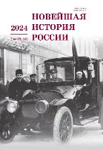Динамика благосостояния в СССР и других социалистических странах в свете антропометрических данных: обзор исследований
In the Light of Anthropometric Data: A Review of Research on the Dynamics of Well-Being in the USSR and Other Socialist Countries
Author(s): I. I. VerniaevSubject(s): Anthropology, Sociology, Health and medicine and law, Demography and human biology
Published by: Издательство Исторического факультета СПбГУ
Keywords: USSR; socialist countries; anthropometric history studies; standard of living; anthropometric indicators; historiography;
Summary/Abstract: This article provides an analytical overview of contemporary studies on the anthropometric history concerning the well-being dynamics of the Soviet Union and other socialist countries (Poland, Czechoslovakia, East Germany etc.). In recent decades, the concept of the “biological standard of living” has emerged, focusing on the fundamental, “human” dimension of a broader understanding of well-being. Within this framework, fundamental aspects of the existence of individuals, entire populations, and nations are examined, including the quantity and quality of nutrition, morbidity, material and psycho-emotional conditions, and the state of the environment. Indicators of the dynamics of the biological standard of living utilized in this study are not monetary (GDP per capita, real incomes etc.) but anthropometric (average height, weight etc.) and demographic (mortality, life expectancy, etc.) characteristics. Anthropometric studies of socialist countries allow overcoming limitations of official sources on well-being, assessing the contribution of state medical infrastructure and social support to the biological well-being of individuals, as well as informal self-sustaining practices. They also enable a comparison of their standard of living with countries of different socio-economic and political structures, detailing the impact on well-being of both long-term developmental factors and short-term fluctuations and crises. Furthermore, the article objectively evaluates achievements in overcoming class, professional, regional, ethnic, and gender inequalities. While the results of anthropometric history studies on the population of the USSR and other socialist countries are significant, there remain unresolved, debatable questions, which are elaborated in detail in this comprehensive review article.
Journal: Новейшая история России
- Issue Year: 14/2024
- Issue No: 48
- Page Range: 700-720
- Page Count: 21
- Language: Russian

